When hiring a candidate for a role in your company, it’s important for them to have a set of desirable soft skills. The best soft skills help employees perform better on the job, integrate into the workplace culture, and handle any conflicts that arise during the workday, whether they happen with a coworker or a client.
Although soft skills are fundamental to job performance, they can be hard to assess in the hiring process. Whereas hard skills usually relate to tangible, more measurable outcomes, testing a candidate’s ability to master broader, less transactional skills can be a challenge.
But there is a way…
In this article, we’ll articulate the difference between soft skills and hard skills, identify the most in-demand soft skills in the modern workplace, and share the best ways to assess soft skills when you’re recruiting.
What are soft skills?
Soft skills — also known as transferable skills or interpersonal skills — refer to the personal traits people have in relation to their work. They’re a set of paradigms, mindsets, disciplines, behaviors, and habits of an individual.
Examples of soft skills include verbal communication, which is fundamental across many roles from salespeople to accountants. Adaptability is critical for people working in fast-moving environments like tech startups, government agencies, and media. And, leadership, which is, of course, important for anyone in management and leadership roles.
These general characteristics can help an individual thrive in the work environment, making them desirable in the workplace.
What’s the difference between soft skills and hard skills?
Soft skills are personal skills that an individual brings to the workplace, but they’re not bound to any specific job. Hard skills are technical skills that enable a worker to complete certain tasks at a particular level of mastery, producing specific, measurable results.
Hard, technical skills enable employees to successfully accomplish tasks and measure their effectiveness.
Examples of hard skills would be coding JavaScript, data entry, or point of sale (POS).
Organizations change and evolve to stay up-to-date with the latest innovations and expect their workforces to do the same. That’s why employees today need to have both a good set of hard skills and soft skills.
For example, an employee working as a software engineer should have mastery over the hard skill of coding in the Angular programming language. But considering the rapid speed of innovation in the workplace, they can’t only rely on a single hard skill for years to come. Maybe Angular won’t be used for coding a few years into the future.
According to the World Economic Forum, the average half-life of skills is only four years. So a software developer needs to also have a soft skill of continuous learning if they want to ensure their value in the marketplace long-term.
The value of hard skills and soft skills are intertwined. Which is why ensuring candidates have a mix of both is crucial to making a great hire.
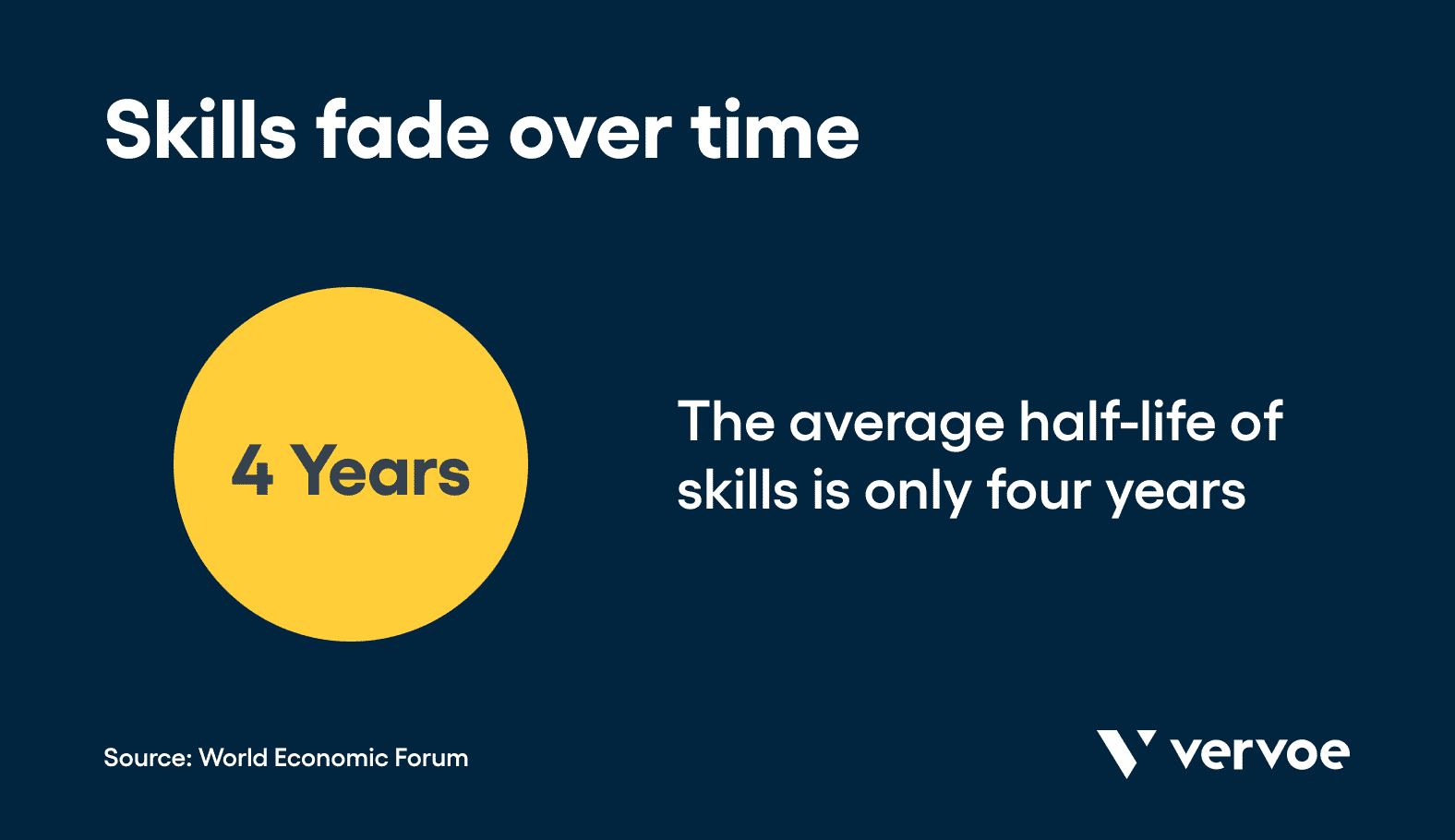
What are the top soft skills in the workplace?
When hiring candidates for the job role in your company, some of the most popular soft skills to look for you should look for the following soft skills examples:
- Communication skills
- Problem-solving
- Critical-thinking
- Empathy
- Confidence
- Resilience
- Openness to feedback
- Learning mentality
- Teamwork
- Analytical mindset
- Creativity
- Conflict resolution skills
- Adaptability
- Persistence
- Leadership skills
- Decision-making skills
- Stress-management
Why are soft skills important in the workplace?
Soft skills are important in the workplace because they are the key to delivering the technical skills expected from employees long-term. The productivity and effectiveness of workers are tied to their personal habits and traits, meaning that although they can technically perform certain tasks at a specific level, their mindset may influence whether or not they can do this consistently and sustainably.
Let’s take a look at the above-mentioned skills and see how they would be applied in the workplace and what roles would benefit greatly from them:
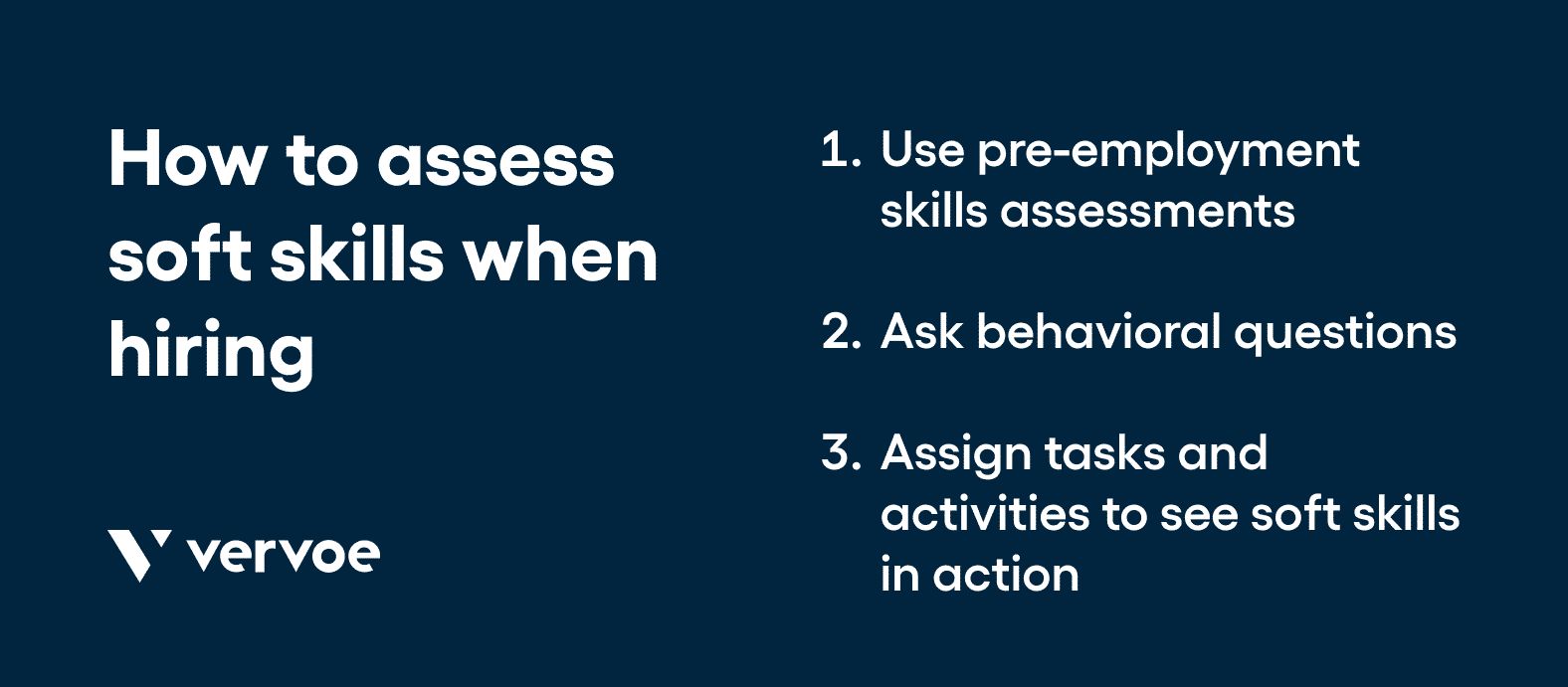
1. Communication skills
An employee should have strong communication skills no matter what their role is. With communication skills, you’re looking for candidates that know how to articulate their thoughts, who can communicate in a clear and concise way, and who can use active listening to realize, understand, and solve problems and challenges in the workplace.
Roles that would greatly benefit from communication skills are business analysis roles, software development roles, sales and marketing roles, human resources roles, and customer service roles.
2. Problem-solving
Problem-solving skills are essential for roles where the employee has to analyze and assess situations, diagnose problems, and identify solutions. It’s one of the key soft skills for roles such as mechanics, engineers, software developers, and business development roles.
3. Critical-thinking
Critical thinking is all about acquiring and analyzing the right data, and making the right decisions based on it. Critical thinking skills are vital for roles in marketing, HR, and sales, where candidates deal with large sets of data and need to make sound business decisions, often under pressure.
4. Empathy
Empathy is about putting yourself in other people’s shoes (emotional intelligence) and looking at the situation from their perspective. Empathy is crucial for roles that develop products and services for people to use. It’s a particularly desirable skill for customer service and customer support professionals, HR workers, and even creatives who need to be patient with clients that struggle to articulate their needs.
5. Confidence
Confidence as a soft skill can complement many roles in the modern workplace. When working in roles that are outward-oriented such as sales, marketing, or business development, Employees need to project confidence in the product or service they’re selling and present themselves and the company in a confident way.
6. Resilience
Resilience is all about handling pressure at work and pushing through the problems and challenges until a solution has been found. A resilient individual won’t stop until they figure out how to overcome the obstacle in front of them. This is an essential skill for healthcare, military, or police employees. It’s also crucial for workers in sales, customer service, and customer support.
7. Openness to feedback
Being open to feedback means creating a culture of feedback around you — an individual with this soft skill will openly give feedback to others (with emotional intelligence) so that they can improve and they will also receive and ask for feedback so they can work on their blind spots and improve. This is a fundamental soft skill for anyone working in a managerial position or a leadership role. It’s also critical for creatives.
8. Learning mentality
Since the technological advances and the speed of innovation is so fast, all employees should have a learning mentality so they can update their skills on time and keep them relevant and up-to-date. This is especially true in highly-technological fields such as software or biotech where the speed of innovation is the fastest. So when hiring software engineers, a learning mentality in employees is crucial.
9. Teamwork
There are few jobs on the planet left where employees don’t need to be team players. For most jobs in the modern workplace, workers need to collaborate well with others. That means that they should put the interest of the team and the company in front of their personal success and goals. You should seek this soft skill in all of your employees.
10. Analytical mindset
An individual working in the office today will face challenges on a daily basis. To ensure that they solve all the problems and challenges, they will need to have an analytical mindset. That means taking the time to look at the data and make calculated decisions that will be of the highest benefit to everyone. You should look for this skill when hiring accountants and business analysts.
11. Creativity
The more chances an employee has to show their creativity, the faster the business will be able to innovate its processes, products, and services. On top of that, creative individuals can find new ways to solve existing problems so they’re highly sought-after in the office. Workers in marketing and design should be the ones with the highest levels of creativity. But if you can find workers in other departments who possess creativity, their teams will be all the better for it.
12. Conflict resolution skills
Working in most office settings involves navigating different personalities and working styles which can cause conflict between employees. That means that you need to have individuals who are well-versed in conflict resolution and who know how to handle conflict in the workplace. This soft skill is essential for employees in managerial roles such as team leaders and office managers.
13. Adaptability
With adaptability, you’re looking for employees who are flexible enough to change their behavior, focus, and skills because of internal or external changes. Employees working in project management or people in product development teams will often have to adapt to the external and internal changes so they’re the prime candidates that need to have this soft skill.
14. Persistence
Persistent individuals will set a goal for themselves and work until they accomplish that objective. An employee who is persistent is great in a sales role where they need to acquire new clients and customers and where they refuse to give up after the first “no”.
15. Leadership skills
Leadership isn’t a position, it’s a skill. Having individuals in your organization who have leadership skills will drastically improve the productivity of everyone involved. It’s the ability to make decisions and encourage others to follow you while supporting them to achieve the goals you’ve set out. Managers and executives should have leadership skills. But it’s also vital to have the people on any given team possess them as well, as the workers within a team play as much of a part in setting the tone and influencing productivity.
16. Decision-making skills
When making decisions, individuals should take into account two things: the available data that will guide them toward the best possible decision, and the organizational values that will guide them through that decision-making process. Having employees who can understand this process and continually make good decisions is an essential soft skill in today’s working environment. This skill is even more relevant for people in managerial roles, where decision-making skills play a bigger role because of their impact on the entire company.
17. Stress-management
Handling pressure in the workplace is an essential skill for workers today. There’s stress everywhere and in almost every role and employees need to have a process with which they handle stress and not break under it. This skill is a must-have for decision-makers, managers, people working in the healthcare sector, and emergency services, like police and fire department workers.
How do you assess soft skills when hiring?
There are three main ways to assess soft skills when hiring.
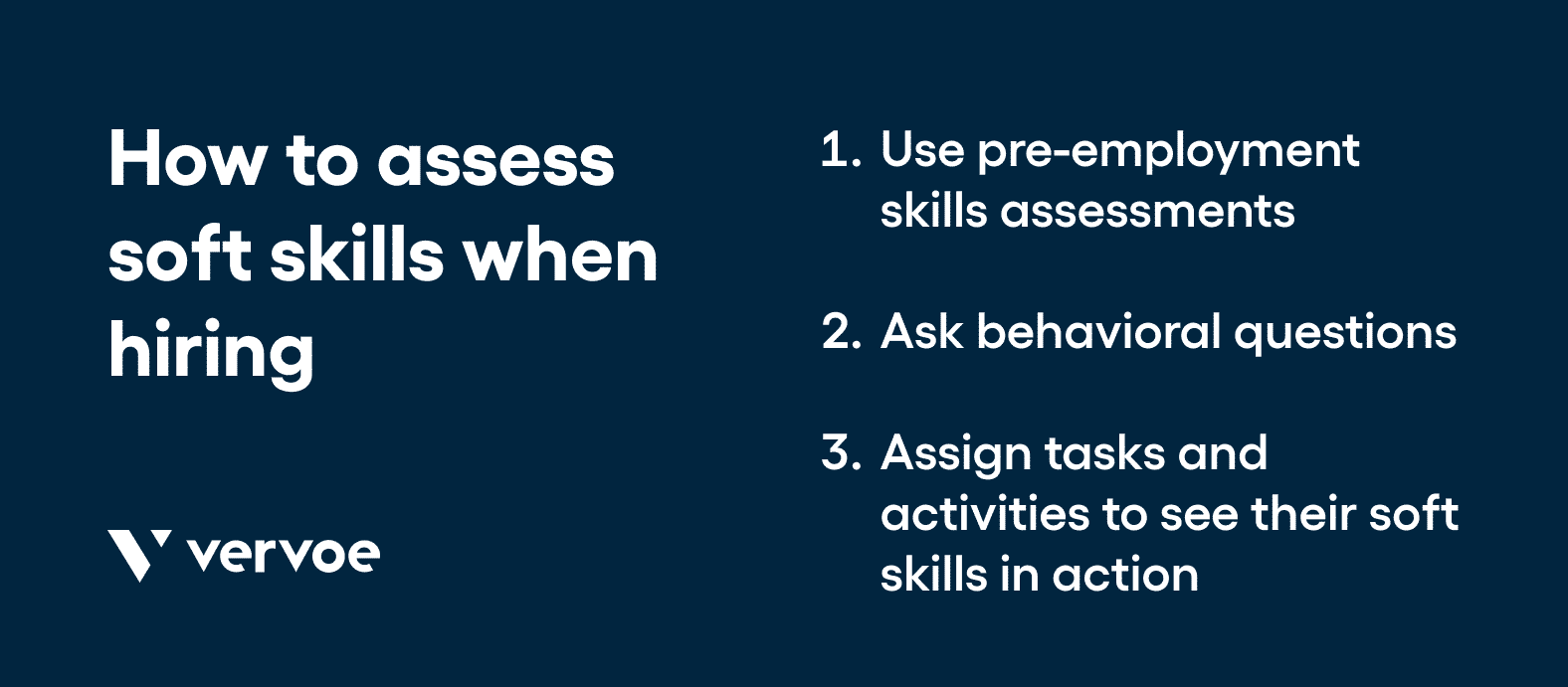
1. Use pre-employment skills assessments
When hiring, you need a way to assess candidates’ mastery of the skills you’re hiring for to ensure they’re the best person for the job.
But testing soft skills can be a challenge compared to testing more tangible hard skills.
This is where skills-based hiring and Vervoe skills assessments come in.
Verifying competency in soft skills involves looking beyond a candidate’s CV, and even chatting to them over the phone or in an in-person interview.
Instead, you want to see their responses to different job-like situations and scenarios and have a way to give all candidates the chance to undertake the same testing, to ensure fairness.
Vervoe’s skill-testing platform offers a diverse range of question types, from multiple choice and text-based questions to video, and audio questions.
Using the platform, you can test candidate responses to on-the-job tasks, challenges, and scenarios that force candidates to demonstrate their ability in using different soft skills, and watch as the powerful AI helps you grade each assessment.
It keeps all candidates on the same playing field, with the same questions consistently asked in each assessment, and reduces the hiring manager’s need to use their unconscious bias to make decisions on which candidates are better than others.
Using Vervoe’s pre-employment assessments early in your recruitment process allows you to test the soft and hard skills of all your candidates up front, and rank and compare candidates having given them a chance to put their best foot forward.
It’s more in-depth than a CV and fairer than using gut instinct to decide who progresses to the next round.
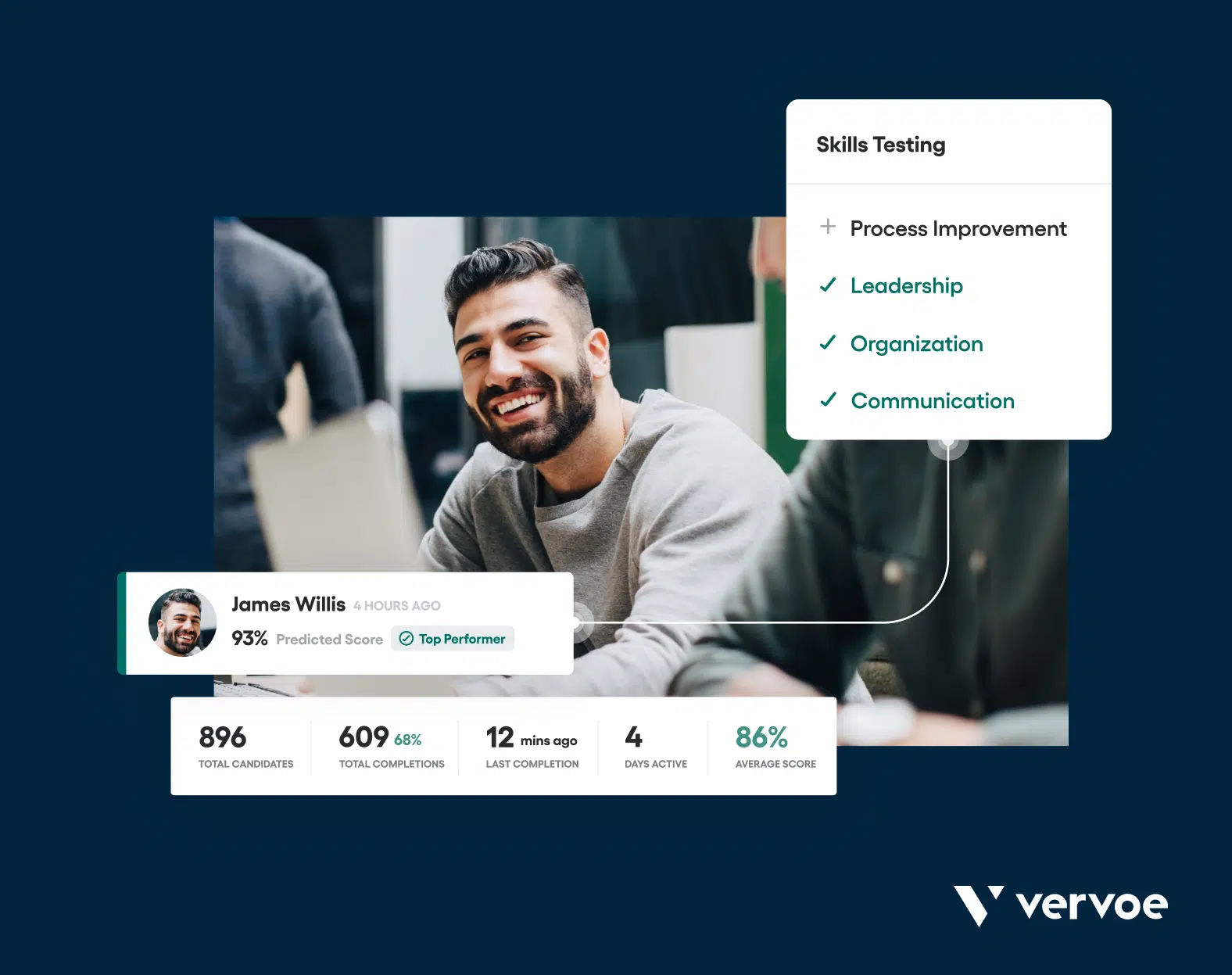
2. Ask behavioral questions
If your hiring process features an interview stage, this is the perfect chance to ask behavioral questions to tease out their approach to different situations and assess their soft skills.
Here, you’ll want to get their gut responses to different situations and scenarios and see how they’d work within your team and organization.
Ask them about different challenges they’ve encountered and how they worked through them. But try not to limit answers to be purely based on work experience, as this begins to discount their skills, and moves the assessment into territory that favors those who have already worked in the industry before.
Previous experience or things like education don’t always indicate performance. So, try and keep questions broad.
For example, you can ask the candidate, “Describe a conflict you’ve had with another person in the past that affected their ability to complete a task. How did you handle it?”
With this question, you’re trying to assess conflict-resolution skills in a candidate and you will get a better understanding of their strong soft skills when they tell you how they handled the conflict at their previous job.
Consistently ask the same set of questions to each candidate, to ensure you’re giving each of them a fair shot. This will make it easier to compare their responses and make hiring decisions based on your interviews.
3. Assign tasks and activities to see their soft skills in action
The last thing you can do is assign candidates a job-related task or activity to assess job seekers’ soft skills. Using a platform like Vervoe, you can see how your candidates apply the right soft skills in real-time to solve problems, edit documents and spreadsheets, complete code challenges, and fix designs.
By getting them to complete the tasks and explain how they worked through them, you can see who has problem-solving skills, organizational skills, and more.
Explore the different question types Vervoe offers, and the different soft skills they can test in candidates.
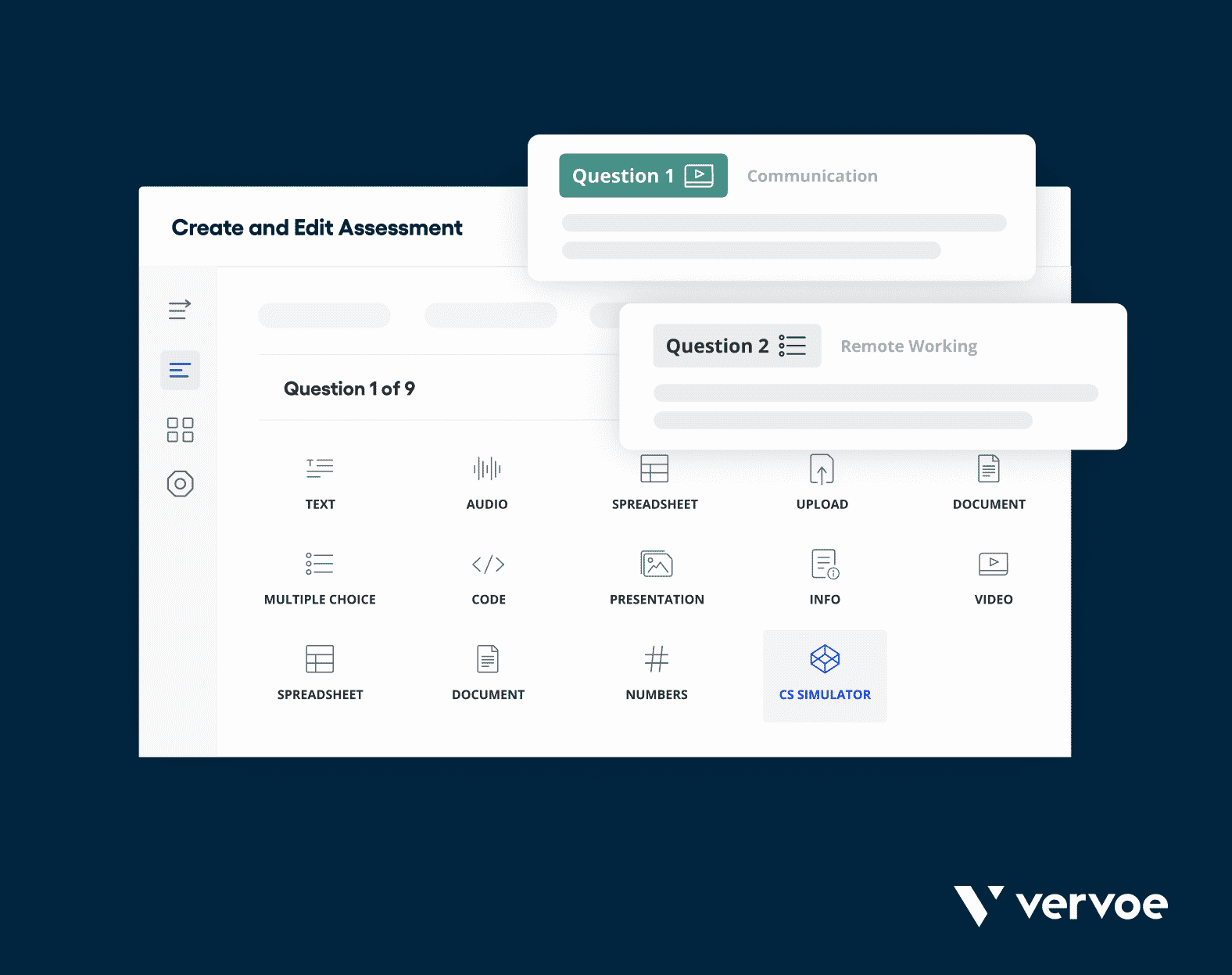
How can you develop your employees’ soft skills?
There are a few different ways that you can develop your employees’ soft skills to increase their productivity and ensure their value long-term for your business.
Set up company-wide training
You can call in an expert in certain soft skills and provide company-wide training courses, where employees work to improve soft skills and apply what they’ve learned in a context relevant to the organization. For example, you can call in a communication expert and have them teach a course to your employees on active listening and communication.
Assign professional development goals
When your team leaders and managers are sitting down with their employees and identifying personal and professional goals, they assess and monitor their mastery of a certain critical soft skill. With this, you’re helping your employees learn or refine their ability at a new skill that’s highly relevant to their field of work. Your organization can then benefit as they apply it in the workplace.
Provide Massive Open Online Courses (MOOC) accounts and online training
There are many MOOC companies out there such as Udemy or Coursera that help people learn soft skills. You can provide your employees with accounts on these platforms and nudge them to start learning or refine a new soft skill every quarter. Make a list of the soft skills most critical to your team, and keep track of who’s progressing in what skill, and who needs work in others.
Conclusion
Throughout this article, we’ve seen the importance of soft skills in the modern workplace. You need to find job candidates that not only have the hard skills to do a certain job, but also have a set of soft skills that will improve their effectiveness, productivity, and adaptability in the workplace.
One of the ways you can evaluate your candidates’ soft skills is by using pre-employment tests and Vervoe can help you with that. For more information about our pre-employment assessments, you should book a demo call with one of our agents, or start using Vervoe today.




















